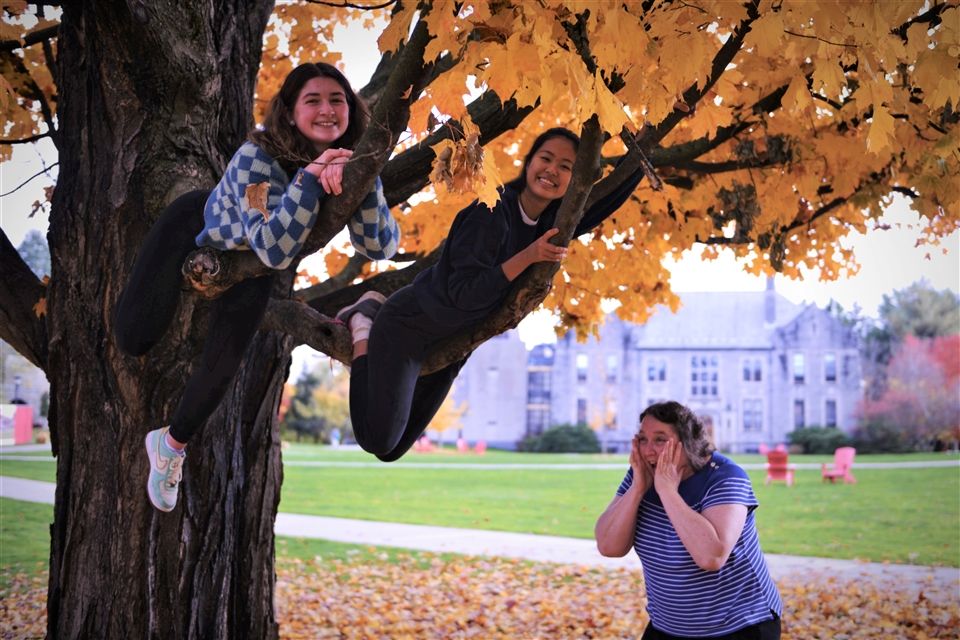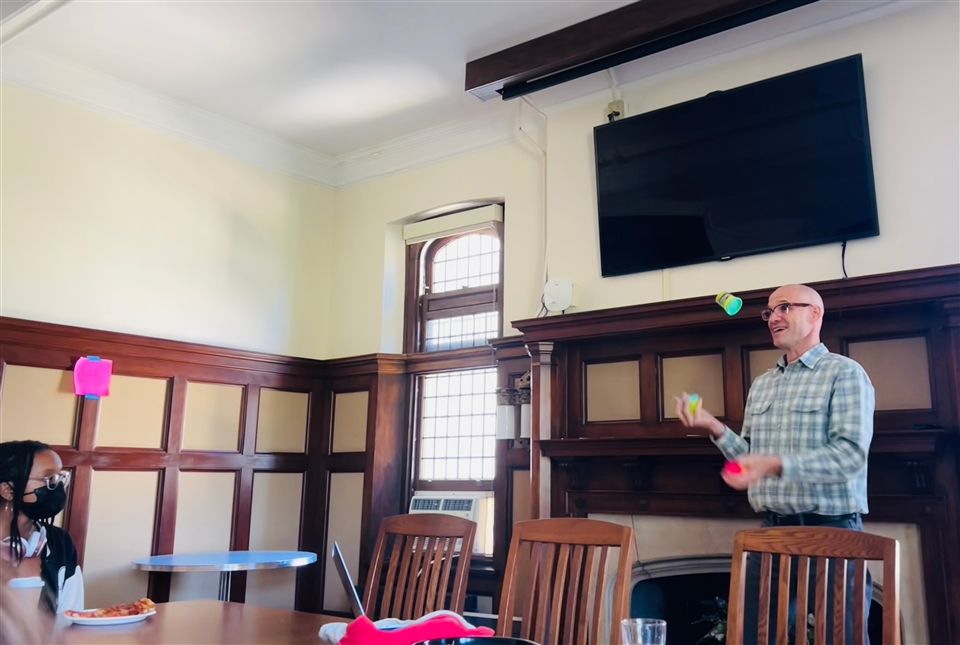Perfectly Respectable Institute of Mathematical and Scientific Educational Services (PRIMES)
11/16/2022
Melissia Mason
This school year, PRIMES—Emma’s math and science tutors—are led by two excited and ambitious students: Ashlyn B. ’24 and Evangeline W. ’23. Addressing concerns over the wellbeing of both the tutors and the students they assist, the two have worked hard to make improvements to the efficiency, publicity, and availability of the program.
INCREASING ACCESS, EFFICIENCY, AND TRUST
“One of the major changes this year is that we switched from public and one-to-one tutors by combining everyone into a scheduled tutor,” Evangeline explains. Previously, tutors were listed publicly along with the classes they tutored, and students wanting additional support (private tutoring) would work with the tutor to find a time to connect. There were some instances where a one-to-one tutor didn’t get assigned a student to help, and there were also those who got connected but met inconsistently due to the timing and lack of monitoring. In order to increase efficiency, the leaders of PRIMES are now assigning blocks of time and assigning one to two tutors to each block. Assistance is available during most blocks and after school, whether in the Math Learning Center, in the lower library, and online via Google Meet.
In addition, there are “floating tutors” who are available from 3:30 to 7:00 p.m. and 9:00 to 11:00 p.m. Mondays through Thursdays. Any time a student needs help, they can email the floating tutor by scanning the QR Code on the PRIMES posters around campus and get a swift response. “These tutors cover almost all of the math and science classes offered at Emma,” Evangeline stresses. “They reply to email quickly so it’s somewhat guaranteed that you can get help.”
This year, PRIMES have asked the teachers of each tutor to certify the specific subjects that they think the student is able to tutor. “There has previously been a perception that your peer wouldn’t know enough to tutor you because they’re around the same age and you’re all learning about the same things,” Evangline explains. “Now the PRIMES tutors are selected and approved by their teacher so students can trust them more and be willing to accept their help.”
SHARING INFORMATION
One of the biggest projects for Ashlyn and Evangeline this year has been making information about PRIMES more readily available. They have developed a brand new website, designed a poster that will change monthly posted on the bulletin board of each hall, and published a series of QR codes that students can scan to easily contact floating tutors directly, view the tutoring schedule, and contact the club’s leaders. “The website has tutoring information, weekend activities, which are new, and previews of who the members of the club are,” Ashlyn shares. “We’re excited that students are able to access all the information in one spot where it’s more organized and professional.”
PRIMES posters answer questions about how to benefit from the services they offer, present fun mathematical or scientific knowledge that people may not know about, and offer jokes or funny memes to get students excited about math and science. “At senior dinner, I overheard someone referencing a joke that was on the poster,” Evangeline shares. “It’s cool that people are actually seeing the poster and reading it. It’s noticeable and people can potentially benefit from it.” The posters are visible across campus, and are changed monthly.
WEEKEND ACTIVITIES
Weekend activities are now part of PRIMES monthly schedule. Ashlyn shares, “Over the summer we planned to have one weekend activity per month, such as an escape room or a scavenger hunt, to get students to know about PRIMES and feel a little bit more comfortable about seeking out help. It's not something to do just if you’re really struggling, but if you have a question you can drop in to the Math Learning Center.” They have already hosted a riddle guessing contest and an escape room in their efforts to make problem-solving fun.
ABOUT WELLBEING
PRIMES are keenly aware of the mental anguish that can surround academic pursuits in math and science. Evangeline herself also serves as a Wellie (Wellness Ambassador) and sees the connections between supporting wellbeing and peer tutoring. PRIMES have made efforts this year to alleviate the anxiety about both offering and seeking help.
Evangline and Ashlyn share that a common sentiment among students is that one’s placement in a certain level of math class reflects on your academic ability in general. As a result, some PRIMES have historically been reluctant to be public about what classes they’re taking and what types of math they are able to tutor. Likewise, students who may want help can be hesitant to seek it out for fear of being judged by their peers. Evangeline and Ashlyn have made efforts to alleviate these concerns through normalizing the need for math and science support, as well as the adjustments they’ve made to the way they assign tutors and the public information they provide about each tutor. On the PRIMES website, tutor descriptions are more personal, including quotes from each member explaining why they got involved with PRIMES.
Also new this year is a bi-weekly PRIMES meeting for club members to be able to ask questions and work together to prepare weekend activities to bond and have fun. They plan to tap teachers who will come to the meetings to share tips on how best to help their students. Although the meetings are optional (because tutors have already committed two hours of their time each week to tutoring), Ashlyn and Evangeline hope that tutors will use the time to get to know each other, share ideas, and nurture their passion for math and science.
The team is also looking forward to offering information to their peers about the importance of building confidence. “I think confidence in math is so important,” Ashlyn explains. “Over the summer I did some research and found data that supports what I was thinking: students who are more confident in math perform better for many reasons. Sometimes people aren’t going to try as hard or put in as much work if they think they’re setting themselves up for failure…people think that you’re either good at math or you aren’t. But really the people who are good at math put in the time so that they develop their talent.” Ashlyn found suggestions for what tutors can do to increase students’ confidence and feel like they do, in fact, have the ability to do math. She hopes that talking to the Emma community about confidence and its impact will get others thinking about it.
Kudos to Ashlyn and Evangeline on their hard work to make PRIMES an even more effective support resource at Emma!

PRIMES leaders Ashlyn and Evangeline tackle the climbing tree while faculty advisor Judy Price looks on

Mr. Bardos was giving PRIMES members advice on how to tutor effectively and was explaining the process of teaching math and science through explaining how to teach someone to juggle.














